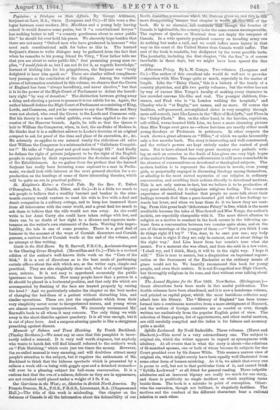Papinian : a Dialogue on State Affairs. By George Atkinson,
Serjeant-at-Law, B.A., Oxon. (Longman and Co.)—If this were a dia- logue between some mode= Mrs. Markham and a young lady leaving
school it would deserve some praise, but if "a constitutional lawyer" has nothing better to tell "a country gentleman about to enter public life " he should for ever hold his peace. We sincerely hope besides that there are not many " Oxford men who have graduated in honours " who need such constitutional milk for babes as this is. The learned Serjeant's fitness to write dialogue may be gathered from the fact that when he remarks to his young friend De Vitry, " Your father tells me
that you are about to enter public life," that promising young man re- plies, "I would fain do so, but I am not fit for it, as regards knowledge."
Instead of kicking him for his priggishness, the Serjeant was "truly delighted to hear him speak so." There are similar stilted complimen- tary passages at the conclusion of the dialogue. Among the valuable pieces of information contained in this volume, we observe that the Crown of England has been "always hereditary, and never elective," but that it is in the power of the High Court of Parliament to defeat the heredi- tary right " by way of donation." The distinction between giving away a thing and electing a person to possess it is too subtle for us. Again, the author himself defines the High Court of Parliament as consisting of King, Lords, and Commons, and yet he ventures to say that William and Mary were not elected, who owed the Crown to the Lords and Commons only. But his theory is a mere verbal quibble, even when applied to the suc- cession of the Hanover branch. Again, he tells us that the Queen is heir to William the Conqueror, when, in fact, the ex-Duke of Modena is. He thinks that it is a sufficient lamer to Locke's doctrine of an original compact to ask for proof of the time and place of its execution, &c., &c.
He solemnly re-applies to our natural vanity the ridiculous old salve that William the Conqueror is a mistranslation of " Gulielmus Conquisi-
tor !" He talks of "that great and good man George III." And finally
he defines the right of private judgment to be the right of the English people to regulate by their representatives the doctrine and discipline of the Establishment. As we gather from the preface that the learned Serjeant has really been lecturing some aspirant to a seat in Parlia- ment, we shall look with interest at the next general election for a re- production on the hustings of some of these interesting theories, which will be quite an era in practical politics.






























 Previous page
Previous page